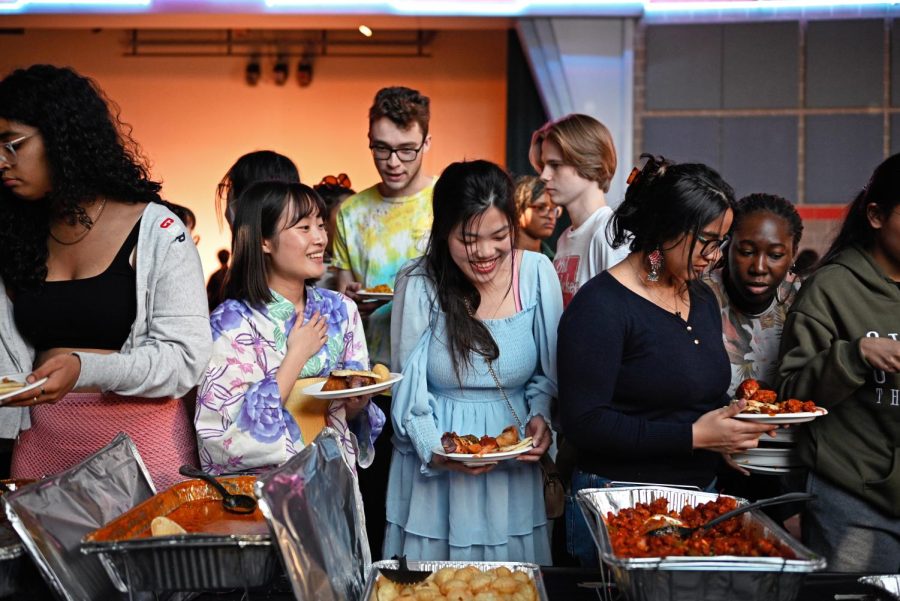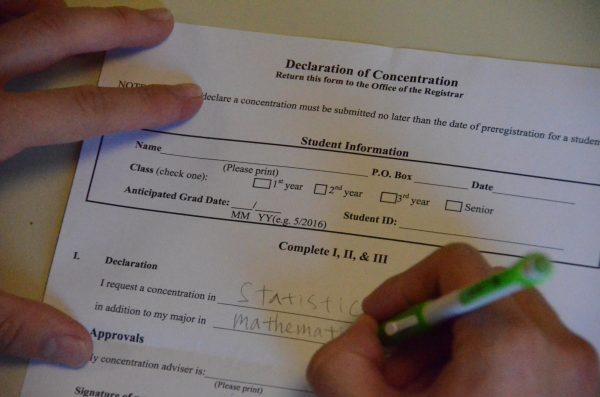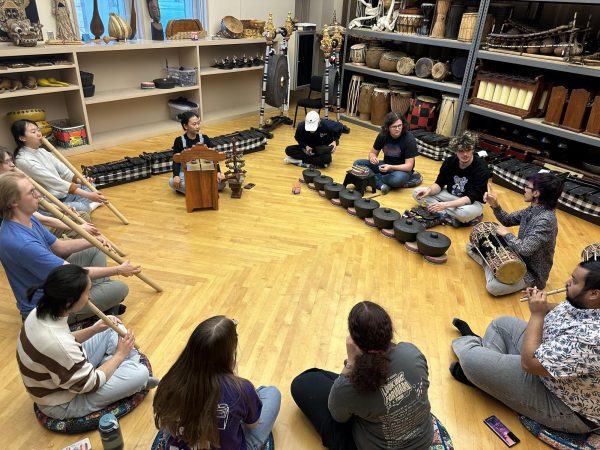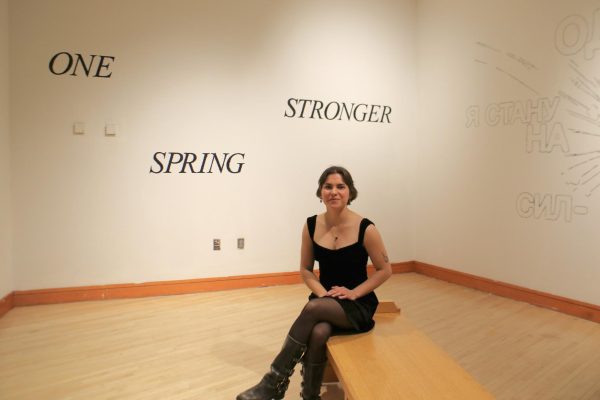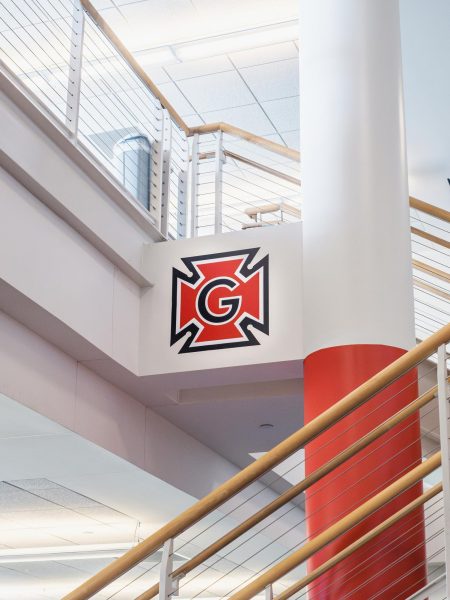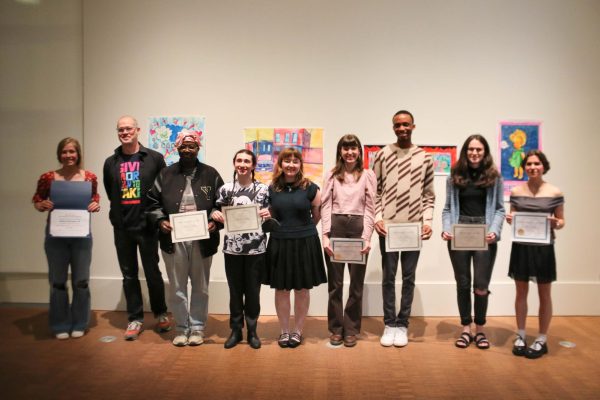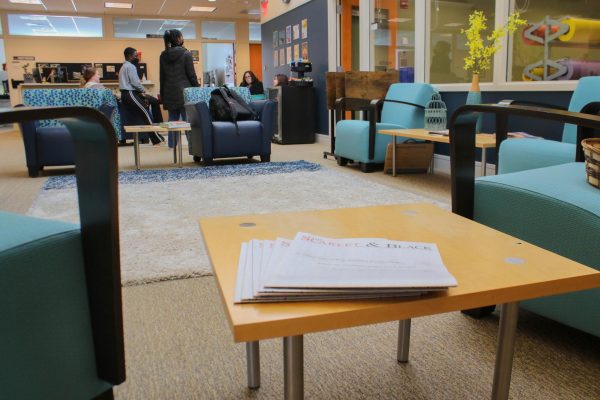ICCO faces difficulty from new budget rules
The International Cultural Cuisine Organization International Dinner brought together global dishes from Grinnell College students. Over 100 students attended.
April 24, 2023
The International Cultural Cuisine Organization (ICCO), a Grinnell College student organization, has faced organizing delays and repercussions in response to new, more formal Student Government Association (SGA) funding procedures announced early in the 2022-23 year, resulting in students unable to plan events or gather supplies. In some cases organizers have spent money out of their own personal funds to put on events.
ICCO members, who received SGA funding for an April 8 event, were later notified in an email sent by Ashley Adams, associate director of student involvement, that the organization had failed to follow proper funding protocols, and it was barred from hosting future events.
Adams requested a formal meeting between representatives between SGA, Student Involvement and the ICCO cabinet, which later occurred on Tuesday, April 18. According to Nameera Dawood `23, ICCO cabinet member, no SGA representative attended the meeting.
Dawood and Hong (Pinkie) Doan `24, another ICCO cabinet member, said they submitted the International Dinner budget two months prior to the event. They said that Student Involvement staff did not notify ICCO of budget concerns until Friday, March 17, immediately prior to spring break.
In the meeting, Dawood said one reason ICCO events have been suspended is because members of the group do not hold food preparation licenses from Iowa, which Doan said will be a requirement for organizations next year. Neither the 2022-23 student handbook nor the spring 2023 student organization funding procedures mentions food safety training.
Doan said each member of the cabinet was willing to undergo food preparation training to host future events, but the College employee responsible for providing licensure was on leave the entire semester. Doan added that she does not know of other student organizations penalized for not yet having food preparation licenses.
Dawood also alleged that Adams told ICCO that next year, student organizations will be unable to acquire clothing, including cultural clothing, using SGA-approved funds.
Removing the ability to acquire clothing and accessories would primarily impact international and cultural groups, Dawood and Doan said, because those groups comprise the majority of student organizations requesting clothing.
Dawood also said that ICCO was only approved to use a limited number of websites to purchase food, which she said might not include options for authentically made international cuisine.
In an email to the S&B, Adams wrote that, “SGA and Student Involvement are working together to streamline processes for clothing,” in response to a request for comment on if student organizations will be allowed to use SGA funds to purchase clothing next fall.
Additionally, Dawood said that because of delays in funding approval, some tablecloths and other utilities did not arrive on time, and ICCO cabinet members purchased about $60 of supplies out-of-pocket.
“We often have to buy things with our money,” Dawood said.
Prior to the fall, students in Student Educational Policy Committees and student organizations who purchased supplies for events or organizations using personal funds were allowed to request reimbursement from the College. However this year, SGA and Student Involvement stopped allowing reimbursement.
“If students are following the funding processes and procedures, they won’t need to spend out of pocket,” Adams said. “Students that could afford to go out and purchase things would go out and go around the actual budgeting process.”
Adams also alleged that allowing reimbursement unfairly disadvantaged students who were unable to afford to spend out-of-pocket, even if later reimbursed, compared to students willing to initially spend money out-of-pocket.
Sarah Toay `23, SGA treasurer, declined request for a verbal interview, citing a lack of time. In a later email to the S&B, Toay wrote that SGA worked with the accounting office and the division of student affairs to craft a new reimbursement process that met fair, legal and ethical standards, and that the process is continually changing in response to student feedback.
SGA treasurers, not Student Involvement, have typically been the primary advocates for changing to funding and budget requests, including this year, according to Adams. She added that the SGA treasurer reviews budget proposals, and Student Involvement only assists in the application if there is a potential for something harmful or high-risk, including in food safety, or to assist in tax-exemption procedures because the College is a 501(c)(3) non-profit.
We often have to buy things with our money.
— Nameera Dawood `23
“I have an obligation within my position, professionally, to make sure that we are being compliant with state and federal laws, and assessing risk management and liability,” Adams said.
Adams said part of the rationale to create standardized funding guidelines was in response to archival records internal to SGA which revealed students receiving funds which were alleged to be using the funds improperly.
“There has been money spent not in ethical ways. In terms of a student requesting funds or a student gaining access to funds that didn’t benefit their student organization but benefited them personally,” she said, citing examples of SGA-approved funds being used for personal technology, steel bows and arrows and non-academic international travel unrelated to a student organization.
“We have a really high student activity fee at the College, so administrators, staff and the students in SGA are concerned that students are paying so high of an amount of the student activity fee,” Adams said, referring to the $492 student activity fee for the 2022-23 academic year. “So how do we make sure again that we’re being ethical in our spending, and how do we make sure that we’re supporting all students?”
Adams said she recognized the issues that can arise with allowing SGA-approved purchases only on two SGA credit cards. This spring, both SGA credit cards were used fraudulently, according to Adams, causing each card to be deactivated at different times in the semester. At one point, zero cards were available for use.
During the interim, DSA and staff members offered other cards for usage, including when purchasing items for the ICCO International Dinner.
Adams said one of the biggest problems that have complicated the ability of student organizations to apply for funding has been SGA and Student Involvement’s lack of a central website for students to find policies and procedures. Instead, Adams said heads of student organizations have relied on accessing funding policies by either finding the policy documents from the fall semester by searching their email inbox or by reaching out to SGA or Student Involvement. Though these policies were primarily provided to student organization leaders, any student may request SGA funding.
“The only way we have to communicate this is via email, and that’s not effective, and we know that it’s not effective,” Adams said. She also said she cannot provide a timeline for when SGA or Student Involvement will release a working website.
Adams said that if students are confused about how to receive funding for events or supplies, they should go directly to DSA or email [studentinvolvement] with 48 hours notice.
“I would really appreciate feedback,” she said. “Student Involvement wants that feedback. What’s working well? What do we need to improve on?”




























































